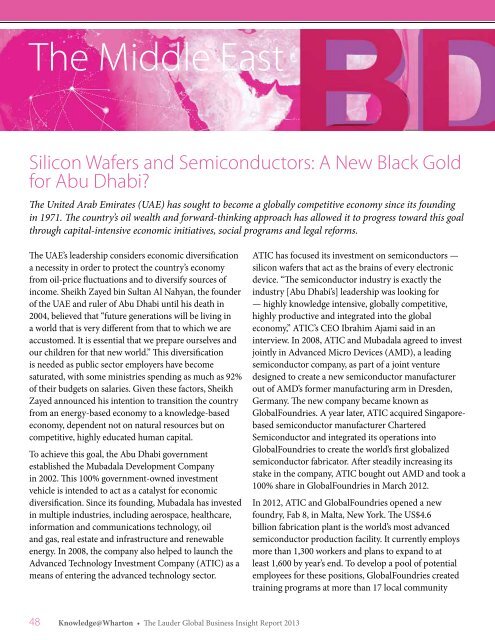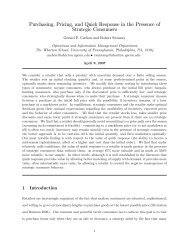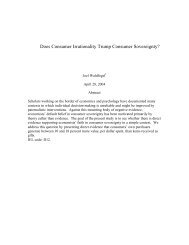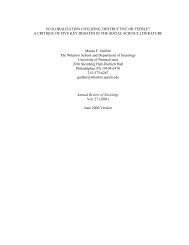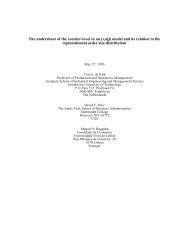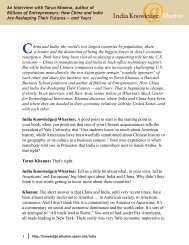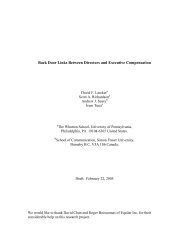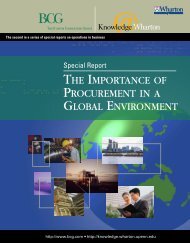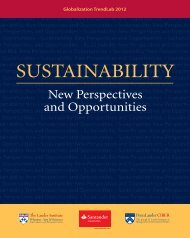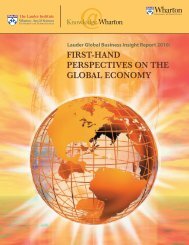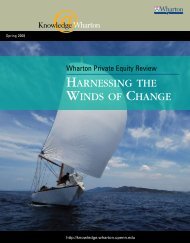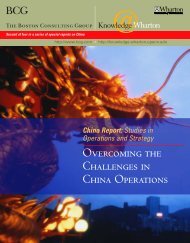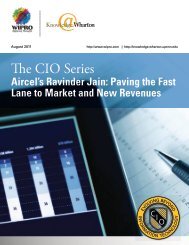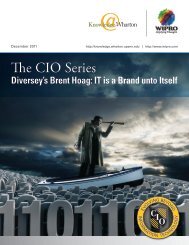building blocks for the Global economy - Knowledge@Wharton
building blocks for the Global economy - Knowledge@Wharton
building blocks for the Global economy - Knowledge@Wharton
You also want an ePaper? Increase the reach of your titles
YUMPU automatically turns print PDFs into web optimized ePapers that Google loves.
The Middle east<br />
silicon Wafers and semiconductors: a new black Gold<br />
<strong>for</strong> abu dhabi?<br />
The united Arab Emirates (uAE) has sought to become a globally competitive <strong>economy</strong> since its founding<br />
in 1971. The country’s oil wealth and <strong>for</strong>ward-thinking approach has allowed it to progress toward this goal<br />
through capital-intensive economic initiatives, social programs and legal re<strong>for</strong>ms.<br />
The UAE’s leadership considers economic diversification<br />
a necessity in order to protect <strong>the</strong> country’s <strong>economy</strong><br />
from oil-price fluctuations and to diversify sources of<br />
income. Sheikh Zayed bin Sultan Al Nahyan, <strong>the</strong> founder<br />
of <strong>the</strong> UAE and ruler of Abu Dhabi until his death in<br />
2004, believed that “future generations will be living in<br />
a world that is very different from that to which we are<br />
accustomed. It is essential that we prepare ourselves and<br />
our children <strong>for</strong> that new world.” This diversification<br />
is needed as public sector employers have become<br />
saturated, with some ministries spending as much as 92%<br />
of <strong>the</strong>ir budgets on salaries. Given <strong>the</strong>se factors, Sheikh<br />
Zayed announced his intention to transition <strong>the</strong> country<br />
from an energy-based <strong>economy</strong> to a knowledge-based<br />
<strong>economy</strong>, dependent not on natural resources but on<br />
competitive, highly educated human capital.<br />
To achieve this goal, <strong>the</strong> Abu Dhabi government<br />
established <strong>the</strong> Mubadala Development Company<br />
in 2002. This 100% government-owned investment<br />
vehicle is intended to act as a catalyst <strong>for</strong> economic<br />
diversification. Since its founding, Mubadala has invested<br />
in multiple industries, including aerospace, healthcare,<br />
in<strong>for</strong>mation and communications technology, oil<br />
and gas, real estate and infrastructure and renewable<br />
energy. In 2008, <strong>the</strong> company also helped to launch <strong>the</strong><br />
Advanced Technology Investment Company (ATIC) as a<br />
means of entering <strong>the</strong> advanced technology sector.<br />
48 <strong>Knowledge@Wharton</strong> • The Lauder <strong>Global</strong> Business Insight Report 2013<br />
ATIC has focused its investment on semiconductors —<br />
silicon wafers that act as <strong>the</strong> brains of every electronic<br />
device. “The semiconductor industry is exactly <strong>the</strong><br />
industry [Abu Dhabi’s] leadership was looking <strong>for</strong><br />
— highly knowledge intensive, globally competitive,<br />
highly productive and integrated into <strong>the</strong> global<br />
<strong>economy</strong>,” ATIC’s CEO Ibrahim Ajami said in an<br />
interview. In 2008, ATIC and Mubadala agreed to invest<br />
jointly in Advanced Micro Devices (AMD), a leading<br />
semiconductor company, as part of a joint venture<br />
designed to create a new semiconductor manufacturer<br />
out of AMD’s <strong>for</strong>mer manufacturing arm in Dresden,<br />
Germany. The new company became known as<br />
<strong>Global</strong>Foundries. A year later, ATIC acquired Singaporebased<br />
semiconductor manufacturer Chartered<br />
Semiconductor and integrated its operations into<br />
<strong>Global</strong>Foundries to create <strong>the</strong> world’s first globalized<br />
semiconductor fabricator. After steadily increasing its<br />
stake in <strong>the</strong> company, ATIC bought out AMD and took a<br />
100% share in <strong>Global</strong>Foundries in March 2012.<br />
In 2012, ATIC and <strong>Global</strong>Foundries opened a new<br />
foundry, Fab 8, in Malta, New York. The US$4.6<br />
billion fabrication plant is <strong>the</strong> world’s most advanced<br />
semiconductor production facility. It currently employs<br />
more than 1,300 workers and plans to expand to at<br />
least 1,600 by year’s end. To develop a pool of potential<br />
employees <strong>for</strong> <strong>the</strong>se positions, <strong>Global</strong>Foundries created<br />
training programs at more than 17 local community


